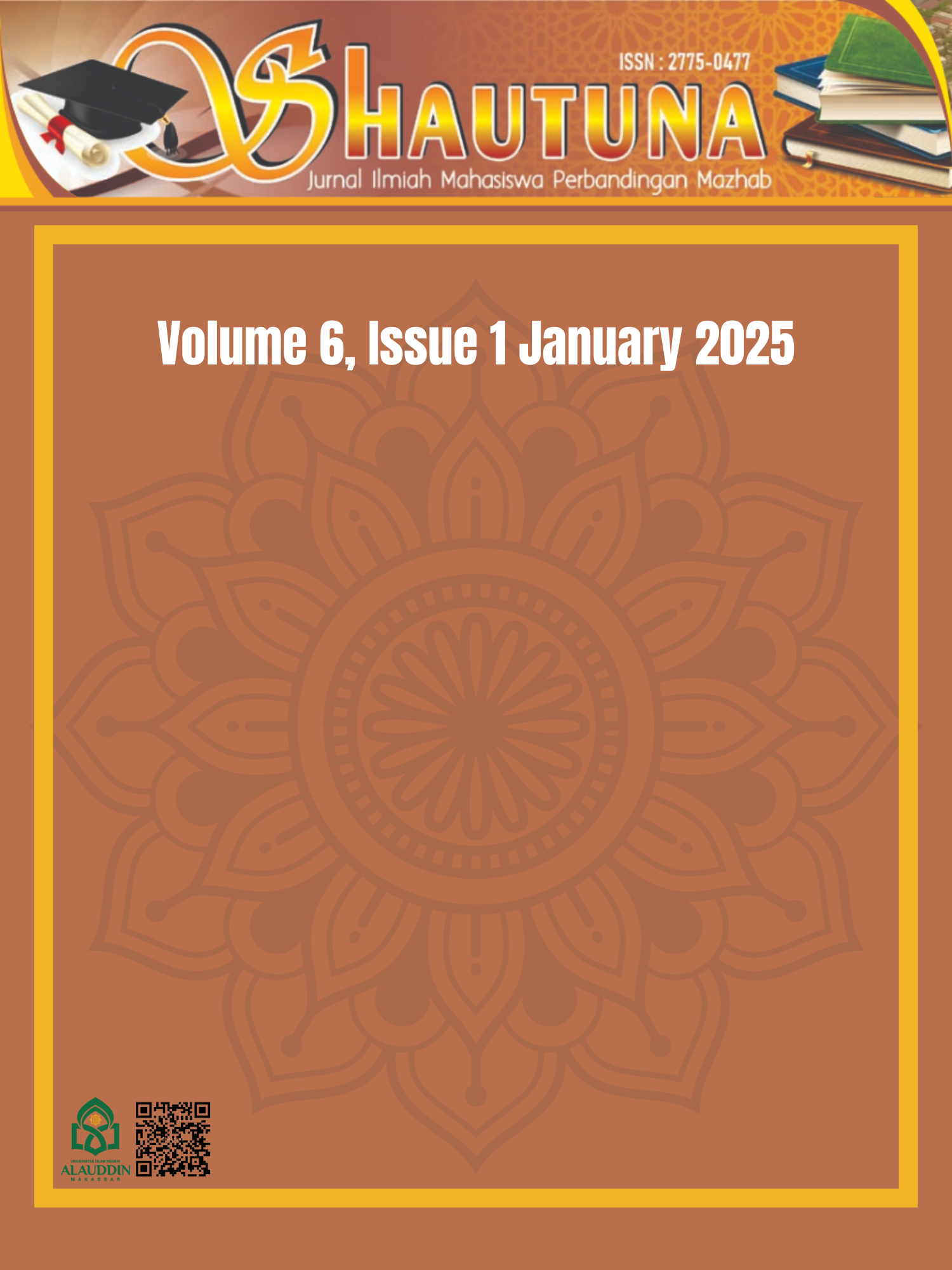Revitalizing the Meaning of Jihad in the Era of Society 5.0
A Study of Radicalism and Moderation among Islamic Organizations in Makassar City
DOI:
https://doi.org/10.24252/shautuna.v6i1.39741Keywords:
Revitalizing, Jihad Meaning, Society 5.0 Era, Radicalization, Moderation, Islamic OrganizationsAbstract
This study aims to analyze the concept of jihad of Islamic mass organizations (CSOs) in the city of Makassar through reconstruction and recontextualization by adjusting the context of the Society 5.0 era, looking at the development of digital technology and rapid social transformation. This research also describes the dynamics of understanding and practicing jihad carried out by Islamic organizations in Makassar City, especially in the spectrum between radicalism and moderation. The research method used is qualitative with an ethnographic approach to see the pattern of use and public belief in the concept of jihad and a phenomenological approach to examine the pattern or relationship between subjective meaning and objective reality in understanding the meaning of jihad today. Data were collected through in-depth interviews, participatory observations, and document analysis from Islamic organizations in Makassar City. The results of the study show that Islamic organizations in Makassar tend to adopt a moderate approach in interpreting jihad, emphasizing spiritual, social, and educational aspects in the delivery of religious narratives, and avoiding interpretations that lead to violence. Acts of radicalism, terrorism and other acts of violence are not the result of the religious doctrine of Islamic organizations in Makassar. However, there are also small groups that still maintain a radical narrative, although their influence is limited. This research seeks to relate the concept of jihad to the challenges and opportunities in the Society 5.0 era, where digital technology is a new medium in spreading religious narratives. This research emphasizes the importance of understanding the transformation of religious thought in the midst of rapid social and technological change, as well as its implications for efforts to deradicalize and promote Islamic moderation.
References
Ahmad Faozan. “Pursuing Peace Through Moral Messages of Jihad; A Way Forwad against Misconceptions of Virtual Jihad.” Sunan Kalijaga: International Journal of Islamic Civilization 3, no. 1 (2020): 38.
Azman. “Penerapan Syariat Islam.” Ad-Daulah: Jurnal Ilmiah Mahasiswa Siyasah Syar’iyyah 7, no. 2 (2018): 291. https://doi.org/https://doi.org/10.24252/ad.v7i2.7243.
Azman Arsyad. “Falsafah Hukum Jihad Masa Kini Dalam Surah Al-Shaf.” Mazahibuna:Jurnal Perbandingan Madzhab Dan Hukum 1, no. 2 (2019): 242. https://doi.org/https://doi.org/10.24252/mh.v1i2.11648.
M.Fadli Nugraha. “The Development and Validation of Jihad Academic Scale (JAS).” Jurnal Pengukuran Psikologi Dan Pendidikan Indonesia 2, no. 2 (2017): 165. https://doi.org/https://doi.org/10.15408/jp3i.v11i2.23372.
Muhammad Wildan, Muammar Bakry. “Pemilihan Pemimpin Non-Muslim Di Wilayah Mayoritas Muslim Perspektif Nahdatul Ulama Dan Muhammadiyah.” Shautuna:Jurnal Ilmiah Mahasiswa Perbandinngan Mazhab 2, no. 3 (2021): 613. https://doi.org/https://doi.org/10.24252/shautuna.v2i3.21282.
Nun Ainun Hasan, Adriana Mustafa. “Partisipasi Wahdah Islamiyah Dalam Pembangunan Kota Makassar Perspektif Siyasah Syariah.” Siyasatuna:Jurnal Ilmiah Mahasiswa Siyasah Syar’iyyah 3, no. 3 (2022): 538. https://doi.org/https://journal.uin-alauddin.ac.id/index.php/siyasatuna/article/view/26860.
Downloads
Published
How to Cite
Issue
Section
License
Copyright (c) 2025 Zulfikar Zulfikar, Azman Arsyad, Abdul Aziz

This work is licensed under a Creative Commons Attribution 4.0 International License.









